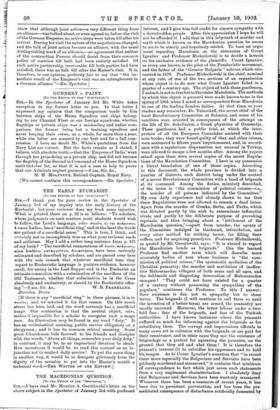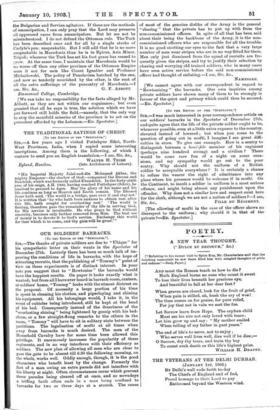THE MACEDONIAN QUESTION. (To TEE EDITOR OF TEE "SPECTATOR. "] SIR, — I
have read Mr. Maurice A. Gerothwohl's letter on the above subject in the Spectator of January 3rd with profound
interest, and I give him full credit for sincere sympathy with a downtrodden people. After this appreciation I hope he will not be offended if I add that in this labyrinth of murder and myth which is known as the Macedonian question he seems to me to be utterly and hopelessly misled. To base an argu- ment regarding Macedonia on the utterances of Count
Ignatiev and Professor Michallowski is to decide a lawsuit
on the exclusive evidence of the plaintiffs. Count Ignatiev, as every one knows, is the pilot of the Panslavistic movement, and the father of the "Greater Bulgaria" scheme which mis- carried in 1878. Professor Michailowski is the chief, nominal at any rate, of one of the two sections of an organisation whose object is to do now what Count Ignatiev failed in a quarter of a century ago. The object of both these gentlemen, I submit, is not to free but to Slavonise Macedonia. The methods by which this object is pursued were made known to me in the spring of 1901, when I acted as correspondent from Macedonia to one of the leading London dailies. At that time, as your readers may remember, Dr. Tatarcheff, the secret chief of the local Revolutionary Committee at Salonica, and some of his satellites were arrested in consequence of the attempt on the life of Dr. Sakellarion, a Greek physician of Gumendja.
These gentlemen had a public trial, at which the inter- preters of all the European Consulates assisted with their note-books; they were found guilty of that and other crimes, were sentenced to fifteen years' imprisonment, and, in accord- ance with a mysterious dispensation not unusual in Turkey, were allowed to escape a few months after. Among the papers seized upon them were several copies of the secret Regula-
tions of the Macedonian Committee. I have in my possession a literal translation of one of those copies. According to this document, the whole province is divided into a number of districts, each district being under the control of a secret Revolutionary Committee with a band of brigands at its command. Among the duties, minutely described, of the latter is " the commission of political crimes—i.e., the murder of all persons indicated by the Committee." My own daily experience had already shown to me that these Regulations were not allowed to remain a dead letter. Apart from the murder of Greeks, Serbs, and Turks, which was dictated partly by the wish to exterminate influential rivals, and partly by the deliberate purpose of provoking reprisals, and thus bringing about a " settlement of the Macedonian question,"—apart from murder, the agents of the Committee indulged in blackmail, intimidation, and every other method for striking terror, for filling their coffers, and for acquiring proselytes. Professor Michallowski, as quoted by Mr. Gerothwohl, says : "It is absurd to regard the Macedonian bands as brigands." Can the learned Professor find another term which will describe more accurately bodies of men whose business is "the com- mission of political crimes," the systematic spoliation of the Christian peasantry, the murder and mutilation of inoffen- sive Mahommedan villagers of both sexes and all ages, and the deliberate and disgusting desecration of Mahommedan mosques? "They could not have existed for a quarter of a century without possessing the sympathies of the populace," continues the Professor. To this I answer: their existence is due not to sympathy but to sheer terror. The brigands (I will continue to call them so until the invention of a better term) are armed, the peasantry are mostly unarmed. Moreover, the latter labour under a two- fold fear : fear of the brigands, and fear of the Turkish authorities. I have known instances where the peasants suffered as much for informing against the brigands as for subsidising them. The corrupt and impecunious officials in many cases act in collusion with the brigands, or are paid for their connivance, and in other cases they use the existence of brigandage as a pretext for squeezing the peasants, on the ground that they aid and abet them ! It is therefore the peasant's interest (?) to subsidise his oppressors and to hold his tongue. As to Count Ignatiev's assertion that "in recent times more especially the Bulgarians and Servians have been- pitilessly murdered and massacred," it contains that minimum of correspondence to fact which just saves such statements from a very unpleasant characterisation. I absolutely deny that Bulgarians and Servians have been wantonly massacred. Whenever there has been a massacre of recent years, it has been due to persistent provocation, and has been the pre- meditated consequence of disturbance artificially fomented by the Bulgarian and Servian agitators. If these are the methods of emancipation, I can only pray that the Lord may preserve all oppressed races from emancipators. But let me not be misunderstood. I do not defend the Ottoman rule. The Turk has been described once and for all by a single stroke of Carlyle's pen: unspeakable. But I will add that he is no more unspeakable in Macedonia than he is in Epirus, Asia Minor, Tripoli; wherever the Turk has set his foot grass has ceased to grow. At the same time, I maintain that Macedonia would be no worse off than any other province of the Ottoman Empire were it not for men like Count Ignatiev and Professor Michailowski. The policy of Panslavism hatched by the one, and now so tenderly nourished by the other, is the root of all the extra sufferings of the peasantry of Macedonia.—I [We can take no responsibility for the facts alleged by Mr. Abbott, as they are not within our cog,nisance ; but even granted that all he says is true, the solution which we have put forward still holds the field,—namely, that the only way to stop the manifold miseries of the province is to act on the precedent afforded by the Lebanon.—En. Spectator.]







































 Previous page
Previous page